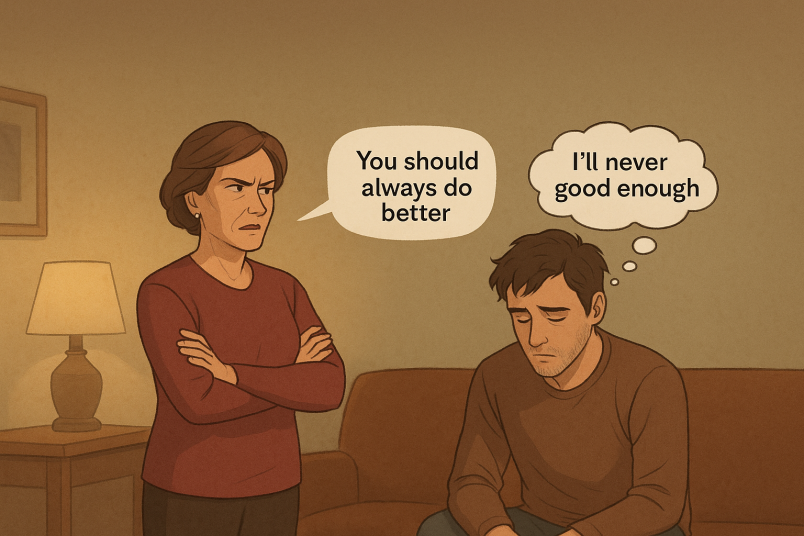Who Is a Critical Parent? Effects & Ways to Cope

Key Takeaways
Marriage.com AI Quick Summary
Growing up, many of us can recall moments when words felt heavier than actions, when approval seemed just out of reach, and when love was tangled with sharp reminders of what we “should” be doing.
A critical parent often means well, but their constant corrections, comparisons, or judgments can leave lasting marks on a child’s heart and mind. Over time, these patterns shape self-worth, relationships, and even the way we talk to ourselves.
It’s not about blame—it’s about noticing the echoes, understanding the impact, and finding gentle ways to heal, breathe, and move forward with kindness…
What is critical parenting?
Critical parenting is characterized by a consistent pattern of criticism directed towards a child by their parent. This approach focuses predominantly on the child’s shortcomings and failures rather than their strengths and achievements.
A research paper published in 2021 states that adolescents who perceive high levels of parental criticism tend to experience more severe depression and worse symptom trajectories over 18 months.
Example: Think of a child proudly bringing home a drawing, only to hear, “The colors are messy,” or “You should have drawn it this way.” Instead of feeling proud, the child learns to question whether their efforts are ever good enough. That lingering doubt often follows them into adulthood.
Please note:
If this feels familiar, please remember—it’s not about labeling parents as “bad.” Many are unaware of the long-term effects and may have been raised the same way. With awareness and compassion, both parents and children can break the cycle and nurture more supportive, loving connections.
5 possible signs of a critical parent
Here’s how you can spot the signs—sometimes they’re obvious, sometimes subtle, but the impact is real. Understanding these behaviors can help you recognize when a critical parent dynamic is at play and take steps toward healthier boundaries.
1. Constant focus on mistakes
A common sign of critical parents is pointing out flaws more than strengths. Instead of celebrating progress, they highlight errors—making children feel like nothing is ever enough. Over time, this creates self-doubt and perfectionist tendencies. Children may even avoid new challenges, fearing more judgment.
- Example: A child shows a math test with 90% marks, and the parent immediately says, “What happened to the other 10%?”
2. Rarely offering praise
Encouragement is essential for building confidence, but critical parents often withhold praise. They may believe showing approval makes kids complacent. In reality, this leaves children craving validation and unsure of their worth. Genuine recognition can shape resilience, but its absence creates emotional gaps.
- Example: After winning a school race, the child hears, “Well, you could’ve run faster if you trained more.”
3. Comparing with others
Comparisons can feel crushing, especially when they become a routine. A critical parent might say things like, “Look how well your cousin is doing,” making children feel inferior. Instead of inspiring growth, constant comparisons can breed resentment, jealousy, or even sibling rivalry.
- Example: “Your sister always keeps her room clean—why can’t you?”
4. High, unrealistic expectations
Setting goals is healthy, but when expectations are impossibly high, children feel constant pressure. Critical parents may expect straight A’s or perfect behavior, ignoring individual strengths and limits. This can lead to stress, burnout, and the belief that love is conditional on achievement.
- Example: A parent demands top grades every semester, regardless of the child’s natural abilities.
5. Dismissing emotions
A critical parent may minimize feelings, telling children they’re “too sensitive” or “overreacting.” This invalidates emotions and teaches kids to bottle up instead of expressing themselves. Emotional dismissal can make children feel invisible, misunderstood, and afraid to seek support later in life.
- Example: A child cries after being bullied, and the parent responds, “Stop being dramatic; it’s not a big deal.”
How critical parenting affects a child’s life
A critical parent may believe they are guiding their child toward success, but constant judgment often leaves deeper marks than they realize. Over time, children raised by critical parents can struggle with self-esteem, emotional security, and even trust in relationships, carrying these effects well into adulthood.
1. Low self-esteem
Children raised by a critical parent often feel their efforts never measure up. Persistent criticism chips away at confidence, making them second-guess their abilities and seek approval elsewhere.
A research paper published in 2024 states that parenting styles, emotional support, and parental involvement strongly influence self-esteem of children— with authoritative parenting and active engagement linked to higher self-worth.
Over time, this creates self-doubt that can affect school, friendships, and even career choices in adulthood.
- Example: A child answers most questions correctly in class, but the parent scolds them afterward for a single mistake, making them believe they aren’t smart enough.
2. Anxiety and depression
When children grow up with a critical parent, they may constantly worry about making mistakes or disappointing others.
Studies have shown that parental excessive control and overbearing involvement from parents is linked to the presence of anxiety and childhood desire.
This ongoing pressure can trigger anxiety, while repeated feelings of inadequacy may lead to depression. Over time, they might struggle with self-acceptance, feel hopeless, or isolate themselves, believing they’re never enough.
- Example: A teenager hides their report card, fearing the parents’ harsh reaction, and eventually feels anxious and withdrawn even in safe situations.
3. Difficulty with relationships
Growing up under the shadow of constant criticism affects one’s ability to forge and sustain healthy relationships. Trust issues, stemming from the fear of being judged or not living up to expectations, complicate interpersonal connections.
These individuals may struggle to open up, express vulnerability, or fully trust partners, often tracing back to the critical scrutiny experienced in their familial relations.
- Example: An adult hesitates to share personal struggles with their partner, fearing they’ll be criticized or dismissed just like they were by their parent.
4. Fear of failure
Children raised by a critical parent often grow up associating mistakes with rejection or shame. Instead of viewing failure as a chance to learn, they become overly cautious, avoiding risks or new opportunities.
This fear can limit their growth, creativity, and confidence well into adulthood, making them hesitant to step outside their comfort zone.
- Example: A college student avoids applying for internships, worried they won’t be “perfect” and will disappoint their family if rejected.
5. Perfectionism
In an attempt to shield oneself from the sting of criticism, some individuals adopt a perfectionist approach, striving for flawless performance in all endeavors.
This form of perfectionism, driven by fear rather than genuine aspiration, is fraught with anxiety and is unsustainable, often leading to burnout and a sense of dissatisfaction.
- Example: An employee spends hours rechecking a simple report, terrified of making even the smallest mistake, and ends up exhausted while still feeling their work isn’t good enough.
6. Defensiveness
Children raised by critical parents often learn to guard themselves against judgment, leading to a defensive attitude in adulthood. They may interpret even gentle feedback as criticism, reacting with anger, denial, or withdrawal.
This constant need to protect themselves can strain friendships, work relationships, and romantic partnerships, as it blocks open communication and growth.
- Example: When a partner kindly suggests a different way to do chores, the person snaps back, “So you think I can’t do anything right?”
7. Internalized critical voice
When raised by a critical parent, children often absorb those harsh messages and replay them in their own minds. Over time, this becomes an inner critic that constantly questions their worth, undermines confidence, and magnifies small mistakes.
This internalized voice can linger into adulthood, shaping self-talk and influencing how they approach challenges or relationships. Breaking free requires awareness and conscious effort to replace criticism with compassion.
- Example: An adult forgets a minor task at work and instantly thinks, “I’m so careless, I always mess things up,” echoing the words once heard from their parent.
8. Avoidance behaviors
Growing up with a critical parent can make children associate tasks, challenges, or even conversations with the risk of criticism. To escape that discomfort, they may develop avoidance behaviors—delaying responsibilities, steering clear of new experiences, or avoiding emotional intimacy.
While this may bring short-term relief, it often creates long-term struggles, such as missed opportunities, strained relationships, and ongoing feelings of inadequacy.
- Example: An adult avoids applying for promotions at work, fearing they’ll face judgment if they don’t perform perfectly in the new role.
9. Substance abuse
Children of critical parents may turn to substances like alcohol, drugs, or even overeating as a way to numb the pain of constant judgment and emotional wounds.
The temporary escape provides relief from feelings of inadequacy or failure, but over time, it can lead to dependency and deeper struggles. This coping mechanism often masks unresolved hurt rather than addressing its root cause, making recovery difficult without support.
- Example: A young adult drinks heavily at social gatherings, not just to have fun but to silence the inner voice that says they’re “never good enough.”
How to deal with a critical parent: 6 healthy ways
Learning how to deal with critical parents isn’t easy, especially when their words echo long after childhood. If you’ve wondered how to deal with overly critical parents, healthy strategies can help protect your self-worth and nurture emotional resilience.
1. Set boundaries
Setting clear boundaries is a critical step in managing the relationship with a critical parent. It’s about communicating your needs and limits in a respectful manner.
- How to do it: You might need to tell your parent that while you value their input, constant negativity is not helpful or welcome.
- How it helps: Establishing these boundaries helps protect your mental and emotional health, creating a space where respect is mutual.
2. Seek understanding
Understanding why a critical parent acts the way they do can be enlightening. Many times, their behavior is a reflection of their own past experiences, fears, or unmet expectations. This doesn’t excuse the behavior, but it can help you approach the situation with more empathy and patience.
- How to do it: A critical mother syndrome, where a mother’s own insecurities or unresolved issues lead her to constantly criticize her children, can stem from her experiences with her parents.
- How it helps: Recognizing this can shift how you respond to criticism, helping to break the cycle of negativity.
3. Communicate effectively
Effective communication is essential when dealing with a critical parent. It’s important to express how their words and actions make you feel without resorting to blame.
- How to do it:. Use phrases like, “I feel hurt when my efforts are criticized,” instead of “You always put me down.” This shifts the focus to your feelings rather than blaming them.
- How it helps: By using “I” statements, you can convey the impact of their criticism on you personally, which can help your parent understand the consequences of their words and potentially lead to more mindful interactions.
4. Seek support
Support from friends, family, or professionals can provide a vital lifeline when dealing with a critical parent. This network can offer emotional support, advice, and validation of your feelings.
- How to do it: Reach out to a trusted friend, join a support group, or consider therapy to process your feelings and gain tools for healthier coping.
- How it helps: For those struggling with how to stop being a critical parent, seeking support can also provide strategies and insights into changing their behavior patterns.
5. Practice self-care
Engaging in self-care activities is crucial for maintaining your emotional resilience in the face of criticism from a critical parent.
- How to do it: Set aside time for activities that nourish you—like journaling, exercise, meditation, or hobbies—that remind you of your value beyond criticism.
- How it helps: Activities that nourish your body, mind, and spirit can help counteract the negative effects of criticism, reinforcing your sense of self-worth and well-being.
6. Establish independence
Achieving emotional and financial independence is a significant step towards minimizing the impact of a critical parent’s influence. Independence allows you to make decisions based on your values and aspirations, rather than seeking approval from a critical parent.
- How to do it: Start by setting small personal or financial goals—like managing your own budget, living on your own, or pursuing a career path that aligns with your passions.
- How it helps: Individuals can navigate the challenges of dealing with a critical parent more effectively, leading to healthier relationships and personal development.
Watch this TED Talk by Jordan Peterson, a psychologist, who shares how to stop overvaluing parental opinions and build personal independence.
7. Reframe self-talk
The voice of a critical parent can easily become internalized, shaping how you speak to yourself. Reframing your inner dialogue is a powerful way to break free from that cycle and build healthier self-esteem.
- How to do it: When you catch yourself repeating harsh thoughts, pause and replace them with compassionate affirmations like, “I am learning, and it’s okay to make mistakes.”
- How it helps: Shifting your self-talk softens the impact of past criticism, fosters resilience, and helps you create a kinder, more supportive inner voice.
FAQ
It’s natural to have lingering questions when it comes to understanding and coping with a critical parent. Here are some quick answers to help clear common doubts.
-
What causes a parent to be overly critical?
Often, critical behavior comes from a parent’s own unresolved issues, stress, or upbringing. They may repeat patterns they experienced, believing criticism motivates, even if it harms them instead.
-
Can a relationship with a critical parent improve?
Yes, with boundaries, open communication, and mutual effort, relationships can shift. While change may be slow, healthier dynamics are possible, especially when both sides commit to respect.
-
How can I protect my self-esteem from criticism?
Focus on positive self-talk, seek supportive relationships, and engage in self-care. These steps create balance, helping you value yourself beyond a critical parent’s words.
Choosing self-worth
Living with the impact of a critical parent can feel heavy, but it doesn’t have to define your future. By setting boundaries, practicing self-care, reframing self-talk, and seeking support, you can begin to heal and reclaim your confidence.
Remember, criticism doesn’t reflect your worth—it often says more about the parent than the child. Choosing healthier responses and nurturing yourself with compassion creates space for growth, stronger relationships, and emotional freedom. The journey may take time, but every step forward is a step toward peace.
 Tips
Tips
Write your tip or submit a video tip
All tips are reviewed before the publishing.
Share this article on
Want to have a happier, healthier marriage?
If you feel disconnected or frustrated about the state of your marriage but want to avoid separation and/or divorce, the marriage.com course meant for married couples is an excellent resource to help you overcome the most challenging aspects of being married.
Recent Articles
Related Quizzes
 We'd love your feedback!
We'd love your feedback!
 Expert Q&A
Expert Q&A
Ask your question related to this topic & get the support you deserve from experts.



















 Thanks for your feedback!
Thanks for your feedback!